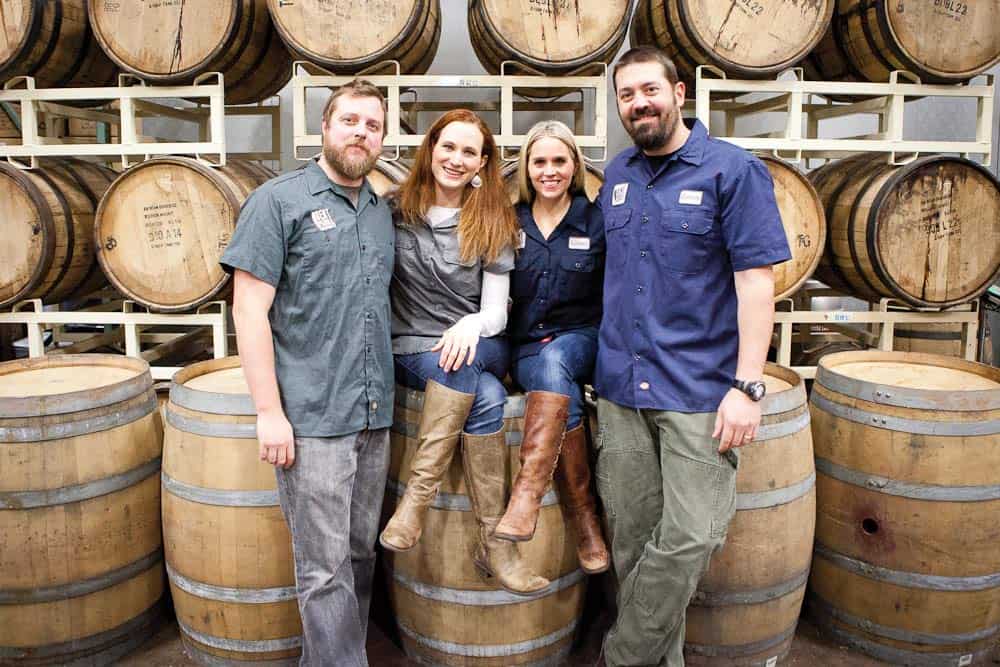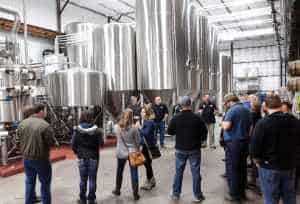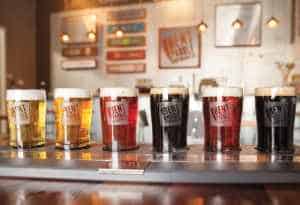
Bent Paddle Brewing of Duluth joins the call to protect the planet’s most precious resource.
By Greg Seitz
The water of Lake Superior is famous for its beauty, depth, cold, and power. It is also gaining a reputation for making great beer. It is pure and pristine, perfect for brewing.
The owners of Bent Paddle Brewing Co., located in downtown Duluth, attribute their quality beer and remarkably rapid success to the extraordinary quality of Gitche Gumee’s water. “It’s an amazingly blank slate,” says co-owner Laura Mullen. “Other breweries have to add minerals or remove minerals to get the same water as we do when we open the tap.”
The water is the single most important reason Bent Paddle was drawn to open its brewery in Duluth in 2013, where the municipal source is the big lake. In the past five years, the company has grown extraordinarily, employing 30 people, selling beer all over Minnesota, and blowing their business expectations out of the water.
They thank Lake Superior.
“It’s a huge part of our success, because the water does change the beer,” Mullen says.
To help protect the source of their success, in October 2015 Bent Paddle joined sixty-eight other Duluth businesses to oppose the PolyMet mine proposal in the St. Louis River headwaters area. The companies believe the mine could contaminate the region’s clean waters.
Together, employing nearly 1,000 people, the Downstream Business Coalition asked the state to invest in sustainable economic development in northeast Minnesota, not risky and short-lived mines.They believe with some work, the whole region could experience an economic renaissance like Duluth has the past few years, based on skilled manufacturing.
“I would love to see investment in different types of industry that would provide good jobs that allow people to stay where they are,” Mullen says.
In addition to Bent Paddle, several other companies have helped put northern Minnesota on the manufacturing map. Loll Designs makes high-end outdoor furniture from recycled plastic; Duluth Pack and Frost River produce canvas and leather softgoods. In Ely, Wintergreen Outerwear is again sewing its beloved anoraks. “These are high quality manufacturing jobs,” Mullen says. “We have well paid, benefits jobs, full time, with huge opportunities. Also, we are connected to our employees, we want them to be here for life if they want.”

But mining pollution could hurt business and progress. The coalition points to PolyMet’s Environmental Impact Statement for predictions, writing in an open letter that the document states “pollution will continue for a ‘minimum of 200 years at the Mine Site and a minimum of 500 years at the Plant Site,’ requiring treatment ‘indefinitely’… contamination will reach the Partridge and Embarrass Rivers, which flow to the St. Louis River and ultimately Lake Superior.”
With this potential of pollution and the demand for jobs on the Iron Range, copper-nickel mining is one of the most controversial issues facing Minnesota’s environment and economy in decades.
Bent Paddle experienced the contentiousness when their stance for clean water was interpreted by pro-mining customers as being opposed to mining. They have been boycotted by many Iron Range bars and liquor stores since joining the coalition. In March 2016, Silver Bay’s city council even voted to remove Bent Paddle from its municipal liquor store.
But the brewers stuck to their stance, and started visiting their former customers. “We went up there and drove around to all the places,” Mullen says. “We explained it only relates to copper-nickel—not ferrous—mining and has nothing to do with union labor. In fact, we’ve used union labor for construction and every expansion.”
Expansions have been frequent. Bent Paddle created a seven-year business plan before opening and blew past it in two years. One year the company experienced four hundred percent growth. They don’t anticipate (or want) that pace to continue, but intend to keep using every opportunity they can to develop in balance with the rest of the world.

Bent Paddle’s mission statement includes sustainability for not only the business but the community, employees, and environment. They have made big strides in a couple short years, but also acknowledge they still have a lot of work to do.
“Every question that comes up for the brewery, we consider the sustainable alternative,” Mullen says. “We’re ready to pay more money for things that are sourced properly, including metals.”
The brewery’s massive stainless steel tanks come from Prince Edward Island, the coastal Canadian province. All the metal comes from the Great Lakes Area, including iron from Minnesota and Michigan. Their cans come from Wisconsin and are infinitely recyclable. Their tap handles are 100 percent recycled plastic, produced by Loll Designs.
But Bent Paddle is not done yet. They are discussing solar panels, environmentally-friendly building materials, and striving toward a zero-waste and low-toxic work environment. “We hope to be conceived over time with our commitment to clean water, as a company that truly, truly cares and has a voice and is a moral compass,” Mullen says.
Like his co-owners, brewmaster Bryon Tonnis is passionate about the Boundary Waters. Several years ago he had just returned home from a canoe trip to his previous job as Head Brewer at Rock Bottom Brewery in Minneapolis when he broke his mashing paddle. Improvising, he retrieved his bent shaft canoe paddle from his car—and found it worked better than the straight brewing tool for the job.
Bent Paddle has outgrown the days of canoe paddles in the brewery, but its roots remain in the wilderness. In fact, its logo is tilted at 14 degrees—the traditional angle of a bent shaft canoe paddle. The name of one of its flagship beers, the 14 Degree ESB amber ale, also pays homage to those origins.
That is also the beer that Mullen says is her favorite, noting how it is well balanced, and award-winning. But what she would reach for after coming out of Boundary Waters after a canoe trip, she says would depend on the weather and the trip.
“If it were a rough one, the Cold Press Black Ale. But if it was hot and glorious, I’d want a Venture Pils.” That Pilsener is a beer they brew in honor of Lake Superior. So clean and pure, Superior’s water resembles that of Czech Republic, where such lagers originated. Without the water, it is almost impossible to brew well anywhere else—except on the shores of Gitche Gumee.
Originally published in Wilderness News Spring 2016 >

